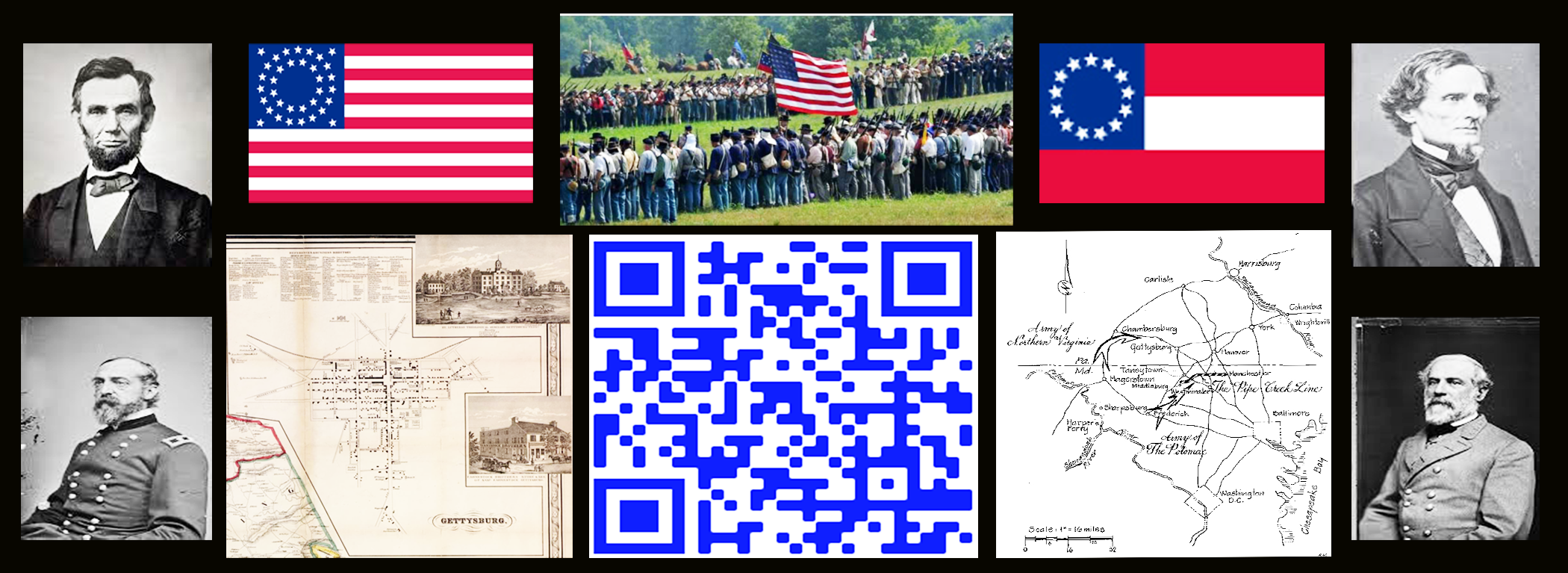A continuation of Scenario 27Defeat at Pipe Creek
Once again, Lee had thrown every division he had at the enemy except for Pickett. He had not sent him in support of Stuart’s cavalry because that was never meant to be an attack in force. Pickett was mainly there to protect Stuart from the unlikely eventuality of a Union attack. As evening fell, Hill and Ewell not so much ordered as allowed their battered forces to retreat back across the mile of open space still littered with the dead and wounded from the initial advance. The long-range Union artillery continued to harass them as they withdrew, but there was so few of them moving in small groups that the shells had little real effect. Naturally, Ewell and Hill had held back a few brigades in reserve that were not committed to the main attack. These were all that now stood between the Union forces and Lee’s HQ at Taneytown.
Lee’s evening commanders’ conference brought the scope of the devastation into focus. Lee had watched in dismay as so few of his 20,000 main attack force straggled back towards Taneytown. That town was now one huge hospital area. Both Hill and Ewell’s corps had suffered 40-50% casualty rates with at least 10% more still unaccounted for. Some of them spent the night cowering in the creek bed. Stuart had fared only slightly better. Longstreet’s casualties were relatively low but so was his hope of any future gains. The best he could hope for was to dislodge Sickles from Middleburg, but that would accomplish nothing in the big picture.
Meade’s Corps commanders had a much better evening gathering. Given the size and ferocity of the battle, their losses were acceptably light. Sickles was still under pressure since Longstreet chose not to withdraw but to continue to harass his lines. To account for the battle losses, Meade ordered First and Eleventh corps to shift towards the Taneytown Road and shorten their lines. Hancock’s two brigades (the other was still supporting Sickles near Middleburg) moved up between Sickles and Reynolds to fill the gap. Additionally, Meade decided to abandon Manchester and shorten his right flank as well. He moved Sixth Corps, which had not been engaged in the fighting, down to Fizzellburg to become the Union Reserve and had Fifth Corps extend its line at a right angle to the south to establish a new right flank. He knew that Lee had little or nothing left to threaten that area.
Reynolds and Sykes argued strongly for a Union attack in the morning (5 July). But since they would need to cross the same open terrain under Rebel artillery fire, Meade nixed that idea quickly. He was willing to remain behind his defensive wall and wait to see what Lee would do next.
The reader will recall that Lee’s main objective in bringing the war into Northern Territory was to put pressure on Baltimore (and so on WASH DC) and hopefully to win a major battle with the Army of the Potomac in the process. By the 5th of July, he had accomplished neither and had all but expended his Army of Northern Virginia in the process. The war would not be brought to a military nor political end this week! There would be no negotiated settlement. The war would go on (for two more years!). Sensing his vulnerability to a Union attack, Lee decided to try to keep the Federal troops in place – not allow them to attack. He ordered Longstreet to stay and pressure the left flank. Stuart would dispatch brigades to harass the right flank, but with no real expectation of any major success.
Pickett’s division was shifted into a blocking position, thinly spread in the wood line south of Taneytown. This was to protect the rear as first Ewell then Hill withdrew towards Emmitsburg and the mountain passes to the west that were the route home to Virginia. Under cover of darkness, on 6-7 July, Longstreet would withdraw due west and also act as a blocking force against any Union counterattack aimed to cut off the main portion of the army as it moved south screened again by South Mountain. The invasion of the north was over! Lee was limping home. Hopefully, he could get there with the portion of his army that he had remaining.
Much to President Lincoln’s dismay. Meade chose not to pursue Lee in force. Lincoln wanted them annihilated, but they would live to fight another day.
